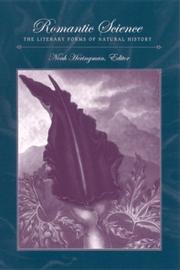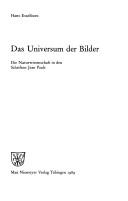| Listing 1 - 10 of 24 | << page >> |
Sort by
|
Book
ISBN: 9782878546927 Year: 2016 Publisher: Paris : Presses Sorbonne nouvelle,
Abstract | Keywords | Export | Availability | Bookmark
 Loading...
Loading...Choose an application
- Reference Manager
- EndNote
- RefWorks (Direct export to RefWorks)
La fascination pour les bêtes sauvages, bien mise en évidence par Jean-Christophe Bailly dans Le Versant animal, s'étend aussi aux textes qui parlent des animaux. Devenue scientifiquement obsolète comme discipline, l'histoire naturelle, dans son ambition inassouvie d'inventaire universel, peut désormais être explorée comme une réserve poétique de discours sur le monde animal. Entre les lignes, elle dit le besoin de raconter des histoires de bêtes, et souligne ainsi l'importance non seulement de la description mais aussi du récit dans l'élaboration des savoirs.S'interroger sur les échos de l'histoire naturelle, depuis Buffon, dans la littérature française, en mettant l'accent sur les textes des XXe et XXIe siècles, nourris de darwinisme et d'éthologie, revient à poser à nouveau frais la question des rapports, au sein du monde animal, entre l'humain et le non-humain. Érudition et fantaisie se côtoient dans des textes qui ne dissimulent plus leur empathie à l'égard des bêtes - dans le cadre désormais reconnu, mais menacé, d'une appartenance commune au monde vivant.
Book
Year: 1997 Publisher: Ann Arbor University of Michigan Press
Abstract | Keywords | Export | Availability | Bookmark
 Loading...
Loading...Choose an application
- Reference Manager
- EndNote
- RefWorks (Direct export to RefWorks)
Book
ISBN: 142142097X 9781421420974 9781421420967 1421420961 Year: 2017 Publisher: Baltimore, Maryland
Abstract | Keywords | Export | Availability | Bookmark
 Loading...
Loading...Choose an application
- Reference Manager
- EndNote
- RefWorks (Direct export to RefWorks)
Ultimately, Natures in Translation demonstrates that--far from being separate from the dominant concerns of British imperial culture--nature was integrally bound up with the business of empire.
Romanticism --- Natural history in literature. --- Nature in literature. --- English literature --- Nature in poetry --- History and criticism.
Book
ISBN: 9781108123396 9781107191327 9781316641897 1107191327 1316641899 Year: 2022 Publisher: Cambridge Cambridge University Press
Abstract | Keywords | Export | Availability | Bookmark
 Loading...
Loading...Choose an application
- Reference Manager
- EndNote
- RefWorks (Direct export to RefWorks)

ISBN: 0791486931 1417538767 9781417538768 0791457028 9780791457023 079145701X 9780791457016 9780791486931 Year: 2003 Publisher: Albany State University of New York Press
Abstract | Keywords | Export | Availability | Bookmark
 Loading...
Loading...Choose an application
- Reference Manager
- EndNote
- RefWorks (Direct export to RefWorks)
Although "romantic science" may sound like a paradox, much of the romance surrounding modern science—the mad scientist, the intuitive genius, the utopian transformation of nature—originated in the Romantic period. Romantic Science traces the literary and cultural politics surrounding the formation of the modern scientific disciplines emerging from eighteenth-century natural history. Revealing how scientific concerns were literary concerns in the Romantic period, the contributors uncover the vital role that new discoveries in earth, plant, and animal sciences played in the period's literary culture. As Thomas Pennant put it in 1772, "Natural History is, at present, the favourite science over all Europe, and the progress which has been made in it will distinguish and characterise the eighteenth century in the annals of literature." As they examine the social and literary ramifications of a particular branch or object of natural history, the contributors to this volume historicize our present intellectual landscape by reimagining and redrawing the disciplinary boundaries between literature and science.Contributors include Alan Bewell, Rachel Crawford, Noah Heringman, Theresa M. Kelley, Amy Mae King, Lydia H. Liu, Anne K. Mellor, Stuart Peterfreund, and Catherine E. Ross.
Natural history in literature. --- Literature and science --- Nature in literature. --- English literature --- Nature in poetry --- History --- History and criticism. --- 19th century --- History and criticism --- Great Britain --- Natural history in literature
Book
Year: 1930 Publisher: Paris : Société d'Edition Les Belles Lettres,
Abstract | Keywords | Export | Availability | Bookmark
 Loading...
Loading...Choose an application
- Reference Manager
- EndNote
- RefWorks (Direct export to RefWorks)
Natural history in literature. --- Sciences naturelles dans la littérature --- Virgil --- Criticism and interpretation. --- Knowledge --- Natural history.
Book
ISBN: 9781350068414 Year: 2020 Publisher: London ; New York : Bloomsbury Academic,
Abstract | Keywords | Export | Availability | Bookmark
 Loading...
Loading...Choose an application
- Reference Manager
- EndNote
- RefWorks (Direct export to RefWorks)
Environmental writing is an increasingly popular literary genre, and a multifaceted genre at that. Recently dominated by works of 'new nature writing', environmental writing includes works of poetry and fiction about the world around us. In the last two decades, universities have begun to offer environmental writing modules and courses with the intention of teaching students skills in the field of writing inspired by the natural world. This book asks how students are being guided into writing about environments. Informed by independently conducted interviews with educators, and a review of existing pedagogical guides, it explores recurring instructions given to students for writing about the environment and compares these pedagogical approaches to the current theory and practice of ecocriticism by scholars such as Ursula Heise and Timothy Morton. Proposing a set of original pedagogical exercises influenced by ecocriticism, the book draws on a number of self-reflexive, environmentally-conscious poets, including Juliana Spahr, Jorie Graham and Les Murray, as creative and stimulating models for teachers and students.
Environnement --- English literature --- Natural history in literature. --- Nature in literature. --- Dans la littérature. --- Poésie. --- History and criticism.
Book
ISBN: 1498518915 9781498518918 9781498518901 1498518907 1498518923 Year: 2015 Publisher: Lanham, Maryland
Abstract | Keywords | Export | Availability | Bookmark
 Loading...
Loading...Choose an application
- Reference Manager
- EndNote
- RefWorks (Direct export to RefWorks)
Romantic Sustainability is an international collection of ecocritical essays that examine sustainability in relation to Romantic-era Britain. The essays examine the traditional Romantic canon but also delve into less well-known authors, all while interrogating issues of race, gender, religion, and identity, beginning with inspiration and creativity and ending with considerations about extinction and apocalypse.
English literature --- Nature in literature. --- Ecocriticism --- Romanticism --- Natural history in literature. --- Ecological literary criticism --- Environmental literary criticism --- Criticism --- Nature in poetry --- History and criticism. --- Romanticism (Literature)
Book
ISBN: 1108123392 1108129099 1107191327 1108126219 Year: 2022 Publisher: Cambridge : Cambridge University Press,
Abstract | Keywords | Export | Availability | Bookmark
 Loading...
Loading...Choose an application
- Reference Manager
- EndNote
- RefWorks (Direct export to RefWorks)
Why do we speak so much of nature today when there is so little of it left? Prompted by this question, this study offers the first full-length exploration of modern British nature writing, from the late eighteenth century to the present. Focusing on non-fictional prose writing, the book supplies new readings of classic texts by Romantic, Victorian and Contemporary authors, situating these within the context of an enduringly popular genre. Nature writing is still widely considered fundamentally celebratory or escapist, yet it is also very much in tune with the conflicts of a natural world under threat. The book's four authors connect these conflicts to the triple historical crisis of the environment; of representation; and of modern dissociated sensibility. This book offers an informed critical approach to modern British nature writing for specialist readers, as well as a valuable guide for general readers concerned by an increasingly diminished natural world.
Natural history literature --- English prose literature --- Nature in literature. --- Natural history in literature. --- History. --- History and criticism. --- Scientific literature --- Natural history --- Nature literature --- Nature in poetry

ISBN: 3484180994 9783484180994 Year: 1989 Volume: 99 Publisher: Tübingen: Niemeyer,
Abstract | Keywords | Export | Availability | Bookmark
 Loading...
Loading...Choose an application
- Reference Manager
- EndNote
- RefWorks (Direct export to RefWorks)
Natural history in literature. --- Nature in literature. --- Natural history in literature --- Nature in literature --- Nature in poetry --- Jean Paul --- -Knowledge --- -Natural history --- -Jean-Paul --- Paul, Jean --- Richter, Jean Paul Friedrich --- Richter, Johann Paul Friedrich --- Knowledge --- Jean Paul, --- Paul, Jean, --- Richter, Johann Paul Friedrich, --- Rikhter, Zhen Polʹ Friderik, --- Richter, Jean Paul, --- Natural history.
| Listing 1 - 10 of 24 | << page >> |
Sort by
|

 Search
Search Feedback
Feedback About UniCat
About UniCat  Help
Help News
News